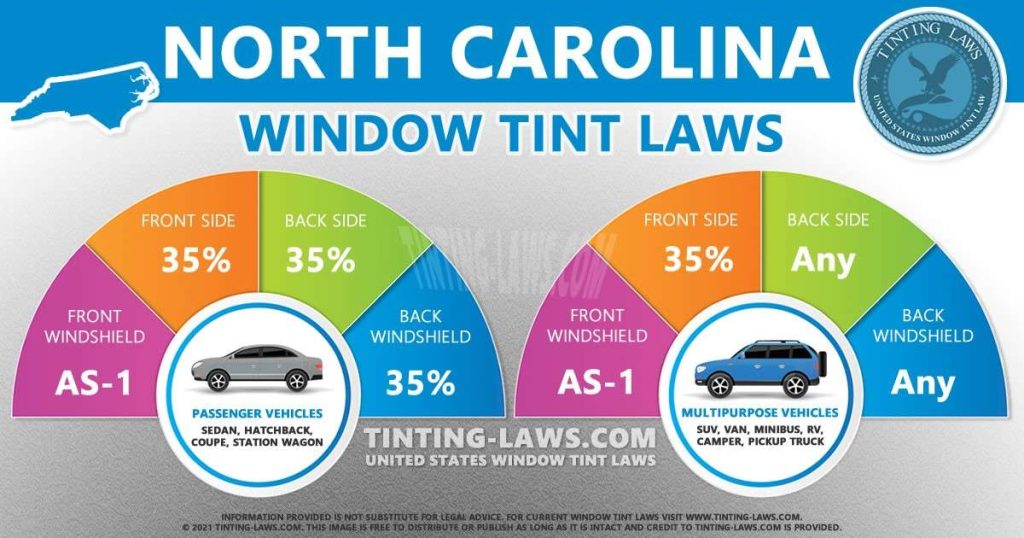North Carolina Window Tinting Laws
Car window tinting laws in North Carolina were enacted in 2001.
We have provided all the necessary information about your car’s window tint, including how dark or reflective the tint is allowed in your state.
There are also additional car window tinting rules and regulations in North Carolina so make sure you read all about it below.
Window tint darkness in North Carolina
The percent of visible light allowed through your car windows is called VLT: Visible Light Transmission.
The percentage of light allowed through your film and glass in North Carolina is very specific and different for sedan cars and SUV cars or vans.
Tint darkness for sedans:
- Windshield: Non-reflective tint is allowed above the manufacturer’s AS-1 line or top 5 inches.
- Front Side windows: Must allow more than 35% of light in.
- Back Side windows: Must allow more than 35% of light in.
- Rear Window: Must allow more than 35% of light in.
Tint darkness for SUV and vans:
- Windshield: Non-reflective tint is allowed above the manufacturer’s AS-1 line or top 5 inches.
- Front Side windows: Must allow more than 35% of light in.
- Back Side windows: Any darkness can be used.
- Rear Window: Any darkness can be used.
Window tint reflection in North Carolina
Window tint can reflect incoming light and reduce glare and heat.
North Carolina window tint law permits a certain window reflection when using a tint so make sure you pay attention to this as well.
Tint reflection for sedans:
- Front Side windows: Must not be more than 20% reflective.
- Back Side windows: Must not be more than 20% reflective.
Tint reflection for SUV and vans:
- Front Side windows: Must not be more than 20% reflective.
- Back Side windows: Must not be more than 20% reflective.
Other North Carolina window tint rules and regulations:
North Carolina does have several other important laws, rules and regulations pertaining to window tinting. They include the following:
- Side Mirrors: If the back window is tinted dual side mirrors are required.
- Restricted Colors: RED, AMBER and YELLOW colors are not permitted.
- Tint Variance: 3% variance allowed (up to 32% VLT).
- Certificates: Film manufacturers are not required to certify the film they sell in this state.
- Stickers: No sticker to identify legal tinting is required. Medical exemption sticker is required if applicable.
- Medical Exceptions: North Carolina allows medical exemptions for special tint. For more details about the specific terms of the exemption, consult your state law.
Keep in mind that North Carolina tinting laws and regulations may be interpreted differently in your county or place of residence.
Restrictions and Exceptions
North Carolina window tinting requirements do not apply to windows on:
- Excursion passenger vehicles defined in G.S. 20‐4.01 (27)a as vehicles transporting persons on sight-seeing or travel tours.
- Motor homes defined in G.S. 20‐4.01 (27)d2 as a vehicular unit, designed to provide temporary living quarters, built into as an integral part, or permanently attached to, a self-propelled motor vehicle chassis or van.
The vehicle must provide at least four of the following facilities: cooking, refrigeration or icebox, self-contained toilet, heating or air conditioning, a portable water supply system including a faucet and sink, separate 110-125 volt electrical power supply, or an LP gas supply. - Ambulances defined in G.S. 20‐4.01 (27)f as vehicles equipped for transporting wounded, injured, or sick persons.
- Property‐hauling vehicles (rear window only), as defined in G.S. 20‐4.01 (31) as Vehicles used for the transportation of property.
- Limousines
- Multipurpose vehicles (e.g., mini-van, pickup truck, SUV) designed to carry 10 or less passengers – where the window is behind the driver and is built on a truck chassis or has special features designed for occasional off‐road operation.
- Law enforcement vehicles.
- Vehicles with a medical exception issued by NCDMV.
We always recommend double-checking our information with your local DMV or law enforcement authorities.

What is the darkest legal tint in NC?
Tinted windows cannot measure darker than 32 percent with a North Carolina-approved window tint meter.
The tint on a windshield cannot extend more than 5 inches below the top of the windshield or below the AS1 line of the windshield, whichever is longer.
How do you get a tint exemption in NC?
North Carolina allows windshield tint with 70% Visible Light Transmission (VLT) under medical waivers.
Permit can be issued by N.C. Division of Motor Vehicles Medical Review Program (NCDMV) for 2 to 5 years.
Medical exception sticker must be displayed in the lower left-hand corner of the rear window.
How much is a tint ticket in NC?
A tint ticket could result in a $50 fine plus court costs, which would total up to $238.
Does a tint ticket affect insurance in NC?
A window tint ticket can affect your car insurance rate, just like any other violation on your record.
Are smoked headlights legal in NC?
According to NCDOT and NC G.S. 20-129(d), it is illegal in North Carolina for taillights or reflectors to be covered or obscured by tint if the original red end lenses or clear lens covers are not originally manufactured with tint.
Our information about window tint laws in North Carolina was last updated in 2024.
Tinting laws in North Carolina were enacted in 2001.
In case any of our info provided is not up to date or correct be sure to contact us so we can fix it. Thanks!
Tint law references:
Window Tinting – North Carolina DMV
North Carolina Statutes § 20-127. Windows and windshield wipers. (.PDF file)
Medical exemption info:
NC Department of Transportation: Tinted window waiver application form (.pdf file)